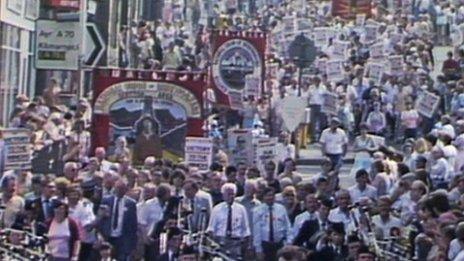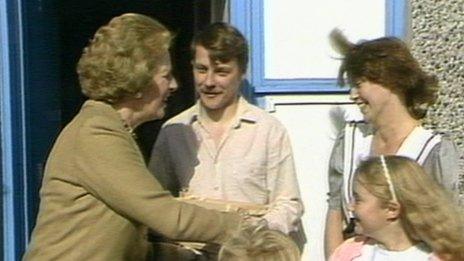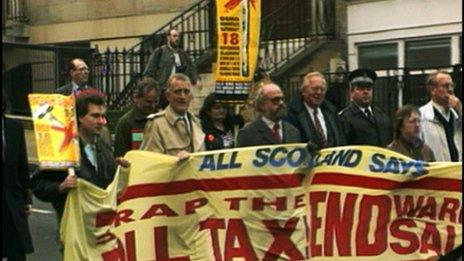Margaret Thatcher: The woman who changed Scotland
- Published
Baroness Thatcher, Britain's first female British prime minister, dies at the age of 87 following a stroke
Love her or loathe her, Margaret Thatcher changed Scotland forever.
She came to power determined to change a Britain she believed was in terminal decline.
"All she was doing was clearing away the debris of what was already a desert on a life support machine," says former Scottish Secretary Lord Lang.
"The life support machine was one fed by taxation pumped in by the Westminster government."
State-sponsored and heavy industry was allowed to fail.
British Steel's mill at Gartcosh, the Invergordon aluminium smelter and the Corpach pulp mill were all swept away.

Mrs Thatcher labelled the striking miners "the enemy within"
But the biggest battle came when Mrs Thatcher took on the miners.
The dispute lasted a year. Mrs Thatcher labelled the striking miners "the enemy within".
"Miners were proud people. Proud to work in the industry and she took that from us, her and her government, during that period," says Nicky Wilson of the National Union of Mineworkers.
"I personally don't think anybody involved in that time will ever forgive her."

Many Scots took advantage of the chance to buy a council house
But Scots loved one of her policies - council house sales.
They may not have voted for it but they bought all the same.
In her famous "Sermon on the Mound" she even appeared to try to convince the Church of Scotland there was a theological justification for her political and economic policies.
She told the Kirk's General Assembly in May 1988: "It is not the creation of wealth that is wrong but the love of money for its own sake."
Another clash came over the Community Charge - which became known as the Poll Tax.
The new charge to replace the council rates was introduced in Scotland first.
Rich and poor were charged the same, provoking a storm of anger and demonstrations and non-payment.

The Poll Tax led to protests and non-payment
Former Labour MP and MSP Dennis Canavan says: "This was such a blatant injustice - this Poll Tax - that people then began to see that this could never happen if we had a Scottish Parliament."
Seen as being imposed on Scotland, it was to prove unacceptable in England.
It led to revolt on the streets and in her own party.
Mrs Thatcher's career was finished.
Former Scottish Secretary Malcolm Rifkind says: "She was a bossy English woman. They could probably have put up with one or even two of these but all three simultaneously was a bit too much. Her style just grated."
Her legacy in Scotland sits in concrete at Holyrood in the form of the Scottish Parliament, according to SNP leader and Scottish |First Minister Alex Salmond.
"What Margaret Thatcher did was turn the Scottish Parliament from being a nice idea - democratic advance to being something absolutely essential," he says.
To many her strengths were also her weaknesses.
Tough but also inflexible. Perhaps that's why she revelled in her title "The Iron Lady".